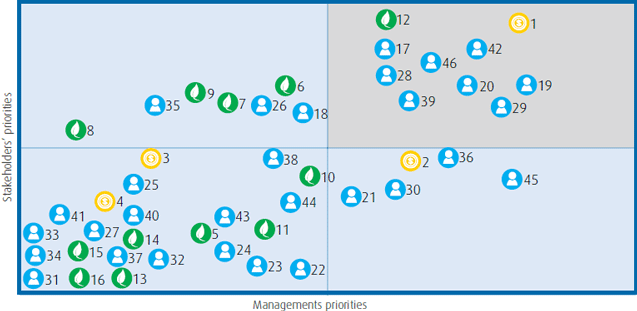
About this Report
comprehensive
option
![]()
For further information or clarification, please contact:
Luciana Ferreira Neves Vasconcelos
Deputy Chief Financial Officer
55 34 3218-3008
luciana.vasconcelos@algar.com.br
www.algar.com.br
Address: Rua Lapa do Lobo, 800 Granja Marileusa
Uberlândia-MG CEP 38406-644
The Algar Group's commitment to transparency and sustainability is present in the preparation of the 2014 Sustainability Report. This is the fourth consecutive year in which our economic, environmental and social performance has presented in accordance with the international Global Reporting Initiative (GRI) guidelines. This year’s report follows the new GRI-G4 version and was prepared 'in accordance' with the Core option.
In addition to the main highlights in the year, information about our management, performance indicators, and profile and governance items is distributed throughout the sections “Relationships” “Sustainable” and consolidated in the index at the end of the publication. The information contained here covers the period between January 1 and December 31, 2014. Where applicable, the indicators can be compared to those of 2013 and 2012, reported in previous versions. The contents cover the performance of eight companies controlled by the Group in the industries of information and communications technology (ICT) (Algar Telecom and Algar Tech), agribusiness (Algar Agro and Algar Farming), services (Algar Aviation, Algar Segurança and Comtec) and tourism (Rio Quente Resorts).
The financial data were collected in accordance with the criteria established by the international accounting standards (IFRS, or International Financial Accounting Standards) and audited by E&Y. In turn, the social and environmental performance indicators were compiled and validated internally, with no external assurance.
Some indicators such as G4-EN3 and G4-EN4 were revised owing to changes in measurement criteria; as a result, this year’s report brings restated numbers posted in previous reports.
Just as in previous years, this report can be found on our website.
Process for Defining Report Content
The Algar Group’s 2014 Sustainability Report was prepared based on both strategic stakeholders’ and the Group’s Board of Executive Officers’ opinions on the relevance of 46 GRI economic, environmental and social aspects.
The Algar Group conducted an internal survey in its companies to determine which of its stakeholders could be considered strategic. The survey focused on stakeholders with which the Group has a closer relationship, such as customers, suppliers and associates among others, or which are impacted by the companies ' operations.
It was conducted in November 2014 through an online questionnaire and resulted in a materiality matrix. Ten issues considered highly relevant are described throughout this report.
Materiality Matrix
Economic Issues
- Economic Performance
- Market Presence
- Indirect Economic Impacts
- Procurement practices
Environmental Issues
- Use and recycling of materials
- Energy consumption
- Water resources and reuse
- Biodiversity management and impact on biodiversity
- Greenhouse Gas (GHG) Emissions
- Control of effluents and waste
- Environmental impact from the use of products and packaging
- Compliance with environmental laws and regulations, and communication channels
- Significant environmental impacts of transporting
- Environmental expenditures
- Supplier environmental assessment
- Environmental grievance mechanisms

Social Issues
- Employment
- Labor/management relations
- Occupational Health and Safety
- Training and Education
- Diversity and equal opportunity
- Equal remuneration for women and men
- Supplier assessment for labor practices
- Labor practices grievance mechanisms
- Investment
- Non-discrimination
- Freedom of association and collective bargaining
- Child labor
- Forced or compulsory labor
- Security practices
- Indigenous rights
- Company human rights assessment
- Supplier human rights assessment
- Human rights grievance mechanisms
- Local communities
- Anti-corruption
- Organization's position on public policy
- Anti-competitive behavior
- Compliance with laws and regulations
- Supplier assessment for impacts on society
- Grievance mechanisms for impacts on society
- Customer health and safety regarding product use
- Product and service labeling
- Marketing communications
- Customer privacy
- Compliance with laws and regulations on products and services